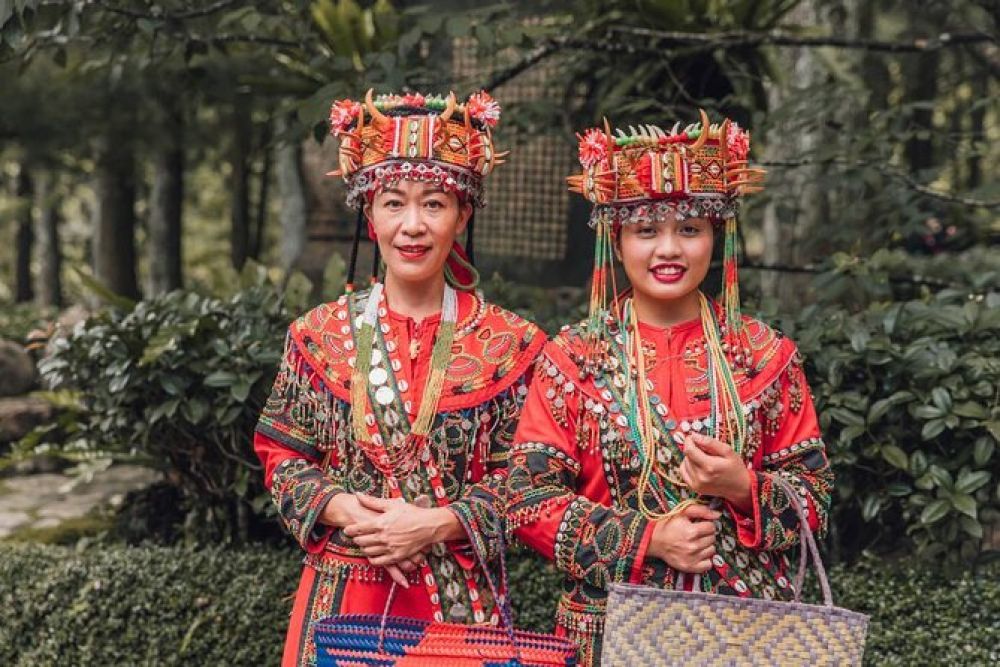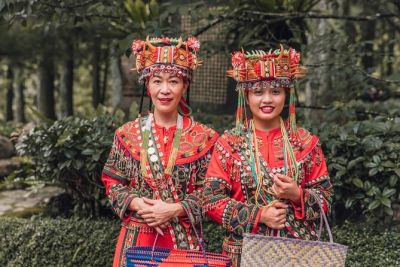

Every spring, Formosan Aboriginal Culture Village becomes adorned with the stunning hues of cherry blossoms. Visitors can immerse themselves in the beauty of these iconic flowers, which create a magical and romantic atmosphere throughout the park. This activity offers an excellent opportunity for photography, leisurely walks, and experiencing the unique blend of natural beauty and cultural heritage that the park provides. The cherry blossoms typically bloom from late February to early April, depending on the weather conditions, making this a highly anticipated seasonal event for both tourists and locals.
Visitors to the Formosan Aboriginal Culture Village can enjoy live cultural performances that showcase the rich traditions and talents of Taiwan's indigenous peoples. The performances include traditional dances, music, and songs that are deeply rooted in the aboriginal culture of the island. The shows are typically held in the park's various theatres or outdoor stages and provide an entertaining and enlightening experience for all ages. The performers wear vibrant, traditional costumes and use a variety of musical instruments, offering a glimpse into the ceremonial practices and cultural expressions of Taiwan's aboriginal communities.
Discover the traditional lifestyle of Taiwanese indigenous tribes by exploring the replica aboriginal villages at the Formosan Aboriginal Culture Village. The villages are constructed to mirror the architectural styles and living environments of different tribes. Guided tours provide an in-depth understanding of each tribe's customs, crafts, and way of life. Visitors can observe traditional weaving, carving, and cooking demonstrations. The interactive exhibits allow guests to participate in daily activities such as making traditional crafts, offering an authentic and educational experience reflecting the diversity of Taiwan's aboriginal heritage.
The European Garden at the Formosan Aboriginal Culture Village is an exquisite display of manicured lawns, elegant sculptures, and colorful floral arrangements. It reflects the opulence of classical European gardens, offering a stark contrast to the aboriginal themes found elsewhere in the park. The gardens are meticulously maintained and feature a variety of plant species, with occasional themed displays or flower shows. Visitors can leisurely stroll through the gardens, take in the serenity and beauty of the surroundings, or rest on a bench to soak up the peaceful ambiance. The European Garden is a delightful retreat for those looking to unwind amidst the harmony of nature and artistry.
For thrill-seekers, the Formosan Aboriginal Culture Village offers an array of amusement park rides that provide fun-filled experiences for families and adventure enthusiasts alike. The park features several high-speed roller coasters, a free-fall tower, a log flume ride, and a range of other attractions suitable for various age groups. The rides are nestled between the cultural exhibits and natural scenery, delivering not only adrenaline rushes but also spectacular views of the region's lush landscapes. Each ride meets rigorous safety standards, ensuring a safe and enjoyable experience for all visitors.
No visit to the Formosan Aboriginal Culture Village would be complete without a ride on the Sun Moon Lake Ropeway. This cable car connects the culture village with the famous Sun Moon Lake, offering breathtaking panoramic views of the lake and surrounding mountains. The 1.8-kilometer journey gives visitors a unique aerial perspective on the area's natural beauty, and the comfortable gondolas provide a peaceful and scenic ride. Whether you're heading to Sun Moon Lake or returning to the culture village, the cable car adventure is an experience that showcases the grandeur of Taiwan's central highlands and cannot be missed.
The Formosan Aboriginal Culture Village offers a host of Do-It-Yourself (DIY) crafting workshops where visitors can create their own aboriginal-inspired handicrafts. Workshops might focus on pottery, beading, leatherworking, or traditional painting, teaching both adults and children about the tribes' artisanal skills. These hands-on activities not only serve as a fun diversion but also provide a tangible connection to the indigenous culture. Each session is led by skilled instructors who guide participants through the crafting process, resulting in a unique and personal souvenir to take home.
The tea ceremony is a cherished tradition in many cultures, and at the Formosan Aboriginal Culture Village, visitors have the chance to participate in a traditional tea ceremony. This serene ritual is typically held in a tranquil setting within the park, offering a moment of calm and reflection. Guests learn about the history and significance of tea within the context of indigenous Taiwanese culture, as well as the proper techniques for preparing and savoring tea. This cultural experience is both educational and relaxing, perfect for those looking to enrich their understanding of Taiwanese customs.
The Formosan Aboriginal Culture Village is situated amidst the beauty of Taiwan's central mountain range, with several nature trails and hiking paths available for outdoor enthusiasts. These serene trails offer varying levels of difficulty and provide an opportunity to explore the local flora and fauna. Hikers can enjoy the fresh air, take in the natural scenery, and even spot some wildlife indigenous to the area. Trails might lead to viewpoints that offer stunning vistas of Sun Moon Lake, the culture village, and the lush forests that blanket the surrounding hills. This activity is perfect for those looking to combine cultural exploration with physical exercise and nature appreciation.
A culinary exploration awaits at the Formosan Aboriginal Culture Village, where visitors can taste an array of traditional snacks and dishes prepared by indigenous tribes. This gastronomic adventure includes delicacies like millet wine, bamboo rice, wild boar meat, and various other tribal specialties. Food stalls and small eateries within the park offer these authentic flavors, allowing guests to sample a variety of dishes. For many, trying the local cuisine is a highlight of their visit, offering insights into the tribes' agricultural practices and cultural customs as well as providing some delicious and memorable meals.
